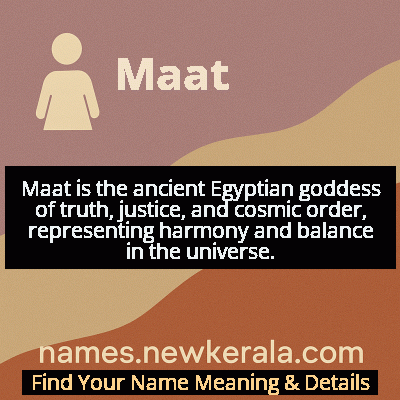Maat Name Meaning & Details
Origin, Popularity, Numerology Analysis & Name Meaning of Maat
Discover the origin, meaning, and cultural significance of the name MAAT. Delve into its historical roots and explore the lasting impact it has had on communities and traditions.
Name
Maat
Gender
Female
Origin
Egyptian
Lucky Number
8
Meaning of the Name - Maat
Maat is the ancient Egyptian goddess of truth, justice, and cosmic order, representing harmony and balance in the universe.
Maat - Complete Numerology Analysis
Your Numerology Number
Based on Pythagorean Numerology System
Ruling Planet
Saturn
Positive Nature
Ambitious, efficient, realistic, and authoritative.
Negative Traits
Materialistic, stressed, confrontational, and can be overly ambitious.
Lucky Colours
Dark blue, black.
Lucky Days
Saturday.
Lucky Stones
Blue sapphire, amethyst.
Harmony Numbers
2, 4, 6.
Best Suited Professions
Business leaders, managers, financial services, law enforcement.
What People Like About You
Leadership, determination, organizational skills.
Famous People Named Maat
Maat
Egyptian goddess
Central deity of truth and cosmic order in ancient Egyptian religion
Maat Mons
Planetary feature
Largest volcano on Venus named after the Egyptian goddess
Maat Pita
Spiritual teacher
Modern spiritual leader incorporating Maat principles into contemporary practice
Name Variations & International Equivalents
Click on blue names to explore their detailed meanings. Gray names with will be available soon.
Cultural & Historical Significance
Beyond mythology, Maat influenced every aspect of Egyptian life from law and governance to art and architecture. Temples were oriented according to cosmic principles of Maat, legal judgments were rendered 'in Maat,' and social harmony was maintained through adherence to her principles. The concept survived through multiple dynasties and even influenced Greek philosophers who visited Egypt. Today, Maat remains relevant as an archetype of universal balance and ethical governance, inspiring modern discussions about environmental sustainability, social justice, and the search for truth in an increasingly complex world.
Extended Personality Analysis
Individuals named Maat typically exhibit strong characteristics of integrity, organization, and natural leadership. They often possess an innate sense of justice and fairness that guides their decisions and interactions. These individuals tend to be methodical thinkers who value structure and balance in both their personal and professional lives. Their analytical nature is complemented by strong intuition, allowing them to assess situations from multiple perspectives while maintaining their core ethical principles. Friends and colleagues often describe them as reliable mediators who can resolve conflicts with wisdom and impartiality.
While Maat-named individuals are generally calm and balanced, they can become quite firm when principles of truth or justice are threatened. They have little tolerance for deception or unfairness and will often take stands against injustice, even when it's personally inconvenient. Their commitment to order doesn't mean they lack creativity—rather, they approach creative endeavors with the same disciplined mindset they apply to practical matters. In relationships, they seek partners who share their values of honesty and mutual respect, and they often become the moral compasses within their social circles. Their combination of strategic thinking and ethical conviction makes them effective in leadership roles where fairness and organization are valued.
Modern Usage & Popularity
In contemporary naming practices, Maat has experienced a modest revival, particularly among parents seeking names with deep historical roots and powerful symbolic meanings. While it remains relatively uncommon in birth registries, its usage has grown in spiritual communities, among Egyptology enthusiasts, and in African diaspora contexts where there's interest in reconnecting with ancient African cultural heritage. The name appears more frequently in academic and artistic circles than in general populations, often chosen by parents who value its associations with truth, balance, and justice. Social media and online communities have contributed to its visibility, with parenting forums occasionally featuring Maat as an unconventional but meaningful choice. Its usage trends suggest it's more popular as a middle name than a first name, and it's sometimes adapted with modern spellings while maintaining the original pronunciation. The name's rarity ensures it remains distinctive while carrying one of the most profound philosophical concepts from ancient civilization.
Symbolic & Spiritual Meanings
Maat represents one of humanity's earliest and most comprehensive symbolic systems for understanding cosmic order and ethical living. Her feather symbolizes the ultimate standard of truth against which all human actions are measured, making her an enduring emblem of justice and moral accountability. Beyond the mythological context, Maat symbolizes the delicate balance between chaos and order that governs both the natural world and human societies. In modern metaphorical usage, she represents environmental equilibrium, social harmony, and the universal search for truth. Her principles anticipate contemporary concepts like sustainable development, restorative justice, and systems thinking. The symbolism extends to personal development as well, where 'living in Maat' means maintaining balance between different aspects of life while adhering to ethical principles. In psychological terms, she represents the integration of shadow and light within the human psyche, and in social contexts, she symbolizes the collective aspiration toward a just society governed by truth rather than power. This rich symbolic legacy continues to inspire artists, activists, and thinkers who seek to apply ancient wisdom to modern challenges.

